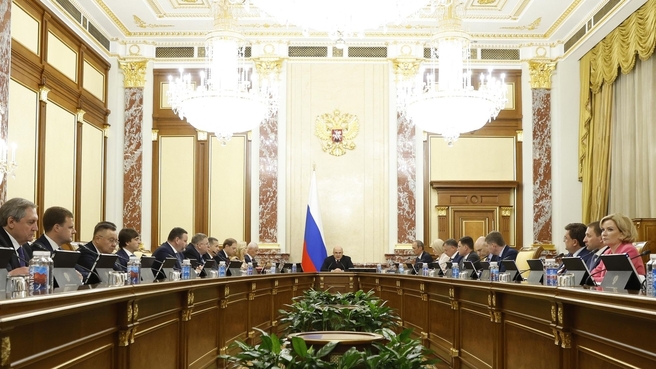Agenda: results of state and municipal oversight in 2022, federal budget execution in the first quarter of 2023, supporting domestic tourism.
Mikhail Mishustin’s opening remarks:
Good afternoon, colleagues.
The agenda of the Government meeting today includes a consolidated report on the results of state and municipal management (oversight) last year.
The President has pointed out that a great deal was recently accomplished in that sphere, with excessive requirements removed and a moratorium on inspections introduced.
The measures taken by the Government helped us reduce the number of inspections of businesses by 240,000 in 2022. Unscheduled inspections were continued only at businesses where there were potential risks to our citizens’ lives and health. Such inspections were also held at social facilities, including in healthcare.
The number of preventive actions taken with regard to businesspeople has increased. It is a result of constructive interaction between businesses and supervisory organisations.
Another frequently used instrument is the pre-trial appeal against the decisions made. This helps settle conflict situations more quickly and with smaller outlays. Approximately 1,500 appeals were filed by late 2021, whereas the figure for last year was over 3,000, and one third of the appeals have been granted in the applicant’s favour.
This method shows that the “help, not punish” principle is more effective and that its addition to supervisory procedures can reduce the administrative burden on entrepreneurs.
The Government will continue to do this. The President emphasised at the St Petersburg International Economic Forum that businesses whose activities were not associated with high human or environmental risks did not need to be inspected at all and that preventive methods would suffice in their case. We must implement the President’s instruction in full and on schedule.
Colleagues, today we will also discuss the execution of the federal budget in the first quarter of 2023.
Despite the complicated external circumstances, we have maintained a considerable share of positive dynamics.
The proportion of the sources of revenue has changed seriously, testifying to the growing contribution of non-raw material sectors of the economy.
As the President pointed out, our real economy, the processing industries and sectors, as well as trade and services are developing and gaining momentum.
Revenues from them have increased by over 10 percent year on year, to more than 70 percent. This means that non-raw material industries provide over two thirds of our income, which is improving our budget stability.
Most importantly, in January to March we prioritised the financing of all the support measures for our people and enterprises.
Colleagues, I would like you to take note of the need to continue to use budgetary funds as efficiently as possible and to ensure the full implementation of our social obligations to our citizens.
One more issue [on the agenda] has to do with continued Government support for domestic travel. Acting on the President’s instructions, we have drafted a law to abolish VAT on domestic travel vouchers, which amounts to approximately 20 percent of their cost. This provision should be adopted for four and a half years starting on 1 January 2023.
Hotels, camping sites, holiday centres and other accommodation facilities will be exempt from this tax. There will be no tax on railway and air travel between Russian regions when the trip does not involve a connection in Moscow or the Moscow Region.
Our country is famous for its beautiful nature and historical monuments dating from different periods, its world-class art masterpieces, and multiethnic cultural diversity. Of course, millions of our citizens and foreigners would like to see all this every year. We hope that the decision taken will help support the travel industry and encourage more tourists to spend their holidays in Russia.









